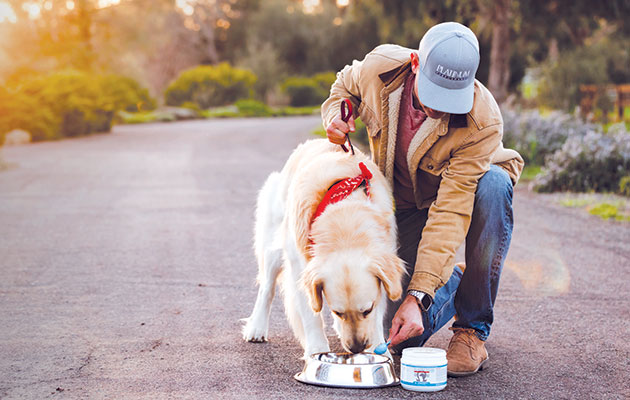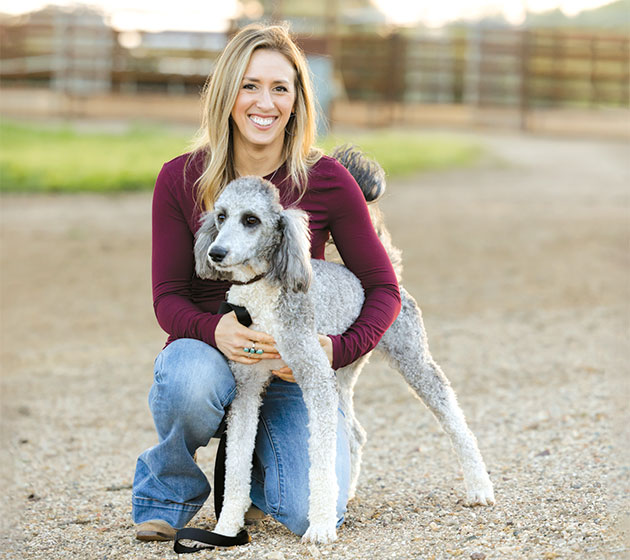A Well-Balanced, Nutrient-Rich Diet Provides Your Dog With the Building Blocks Needed to Thrive
A dog’s diet requires six essential groups of nutrients: water, protein, carbohydrates (including fiber), fat, minerals and vitamins. Vitamins may seem like a small player in your pet’s diet, but don’t let size fool you — these micronutrients pack a mighty punch. Needed in just miniscule amounts, they support everything from energy production to immune function, skin and eye health, and more.
Although they don’t make up a large portion of the food in your dog’s bowl, vitamins are vital to a balanced diet and play a major role in keeping our dogs strong, healthy and full of life.

While small in quantity, the impact of vitamins in a pet’s diet is powerful — quietly working to keep your dog’s body running smoothly. These unsung heroes support every aspect of your dog’s health and longevity.
While small in quantity, the impact of vitamins in a pet’s diet is powerful — quietly working to keep your dog’s body running smoothly. These unsung heroes support every aspect of your dog’s health and longevity.
What Are Vitamins?
Vitamins are organic compounds that all animals require in small quantities to keep their bodies functioning properly. While dogs can produce some vitamins on their own, others must come from their food. There are 13 essential vitamins, which fall into two categories based on their solubility. Understanding the distinction between fat-soluble and water-soluble vitamins is important because it affects how each of these necessary nutrients are absorbed, stored and eliminated.
Fat-Soluble Vitamins
These vitamins include A, D, E and K. These are best absorbed with dietary fats and are stored within fat tissues and the liver. This storage ability allows the body to maintain a reserve, but that also means that an excessive intake of these vitamins can lead to toxicity.
Vitamin A
Retinol is the active form of vitamin A found in animal-based foods such as liver and egg yolks. When dogs digest this active form, it can be directly utilized to meet their nutritional requirements. Beta- carotene, a plant-based precursor to vitamin A, must first be converted into an active form before it can be used by the body. Dogs can convert beta-carotene to vitamin A, but the conversion process makes this form less biologically efficient than retinol. Consumption of beta-carotene is not currently linked to vitamin A toxicity in canines. However, the excess intake of vitamin A as retinoids can and should be avoided.
Vitamin A is well-known for maintaining healthy vision, but it is also in nearly every organ of the body. It supports cellular function and tissue repair, especially in the skin and mucous membranes. In fact, it helps the body combat illness by producing mucus that lines the airways and digestive tract, forming a crucial part of the immune system’s first line of defense. Vitamin A is also essential for skin and coat health, as well as reproductive health. For growing puppies, it is key to skeletal and brain development. Since puppies cannot store vitamin A, they rely on their mother’s milk to be a constant source during their first weeks of life. Without sufficient vitamin A in the first eight weeks, puppies can experience growth deficiencies and developmental issues.

Vitamin D
Often referred to as the “sunshine vitamin,” vitamin D is typically obtained through sunlight exposure. Ultraviolet B (UVB) rays from the sun hit the skin and trigger a process that allows the body to naturally produce vitamin D. While spending time outdoors helps humans meet their vitamin D needs, dogs cannot synthesize enough from sunlight to meet their requirements, so they must consume the vitamin in their diet.
In nature, vitamin D exists in two inactive forms that convert into a form the body can use. In a dog’s diet the primary form is cholecalciferol (vitamin D3), while the other, ergocalciferol (vitamin D2), is plant-derived with a lower absorption rate than D3. Vitamin D is essential for calcium absorption from the intestine as well as regulating calcium and phosphorus balance in the body. It plays a key function in bone growth, mineralization and remodeling (the body’s process of removing old bone and replacing it with new bone), all vital for a healthy skeletal system. Additionally, vitamin D is important for muscle, nerve and immune system health. Because it is fat-soluble, there is a risk of overdosing. Excessive vitamin D can lead to calcium buildup in the blood, potentially causing soft tissue calcification — in the kidneys and heart.
Vitamin E
Vitamin E is a potent natural antioxidant that helps protect healthy tissues from the damaging effects of free radicals. These unstable molecules are natural byproducts of metabolic processes that can cause oxidative stress that harms cells, tissues and organs, contributing to aging and a range of health issues — inflammatory conditions, heart disease and cancer. As an antioxidant, vitamin E helps maintain the health of a dog’s skin, organs and muscles, while also bolstering the immune system, so it can better battle infections and disease. Additionally, vitamin E is vital to cell function and repair, particularly in muscles and nerves. It exists in several forms known as tocopherols. When “mixed tocopherols” are listed on a dog food label, it typically refers to a combination of four forms of vitamin E (alpha-, beta-, gamma- and delta-tocopherol). Among them, alpha-tocopherol (α-tocopherol) is the most biologically active and effective form because it is easier for the body to absorb and use.
Since dogs cannot produce vitamin E naturally, it must be provided through what they eat. Although it is fat-soluble, vitamin E toxicity is exceedingly rare.
Vitamin K
Vitamin K, often called the “coagulation vitamin,” is essential for proper blood clotting. In addition to its role in blood health, vitamin K is involved in bone metabolism and mineralization, to maintain healthy bones. It also helps reduce calcium buildup in arteries, lowering the risk of heart-related conditions. Dogs are able to synthesize it from the bacteria in their gut, so it is not considered an essential dietary nutrient. As long as a dog has a healthy gut microbiome, he should produce adequate amounts of vitamin K. However, a deficiency may arise in cases where the gut is compromised or in certain medical conditions.
There are two primary forms of the vitamin: K1 (phylloquinone) and K2 (menaquinone). Vitamin K1, found in plants, is the main form that dogs receive through their diet. Vitamin K2, on the other hand, is produced by the dog’s gut bacteria but can also be obtained from certain animal products and fermented foods. K3 (menadione), is a man-made synthetic form used in pet foods. The dog’s body regulates vitamin K levels, with no known dietary toxicities associated with vitamin K1 or K2. However, K3 can pose a toxicity risk and has been linked to adverse reactions, such as reduced hemoglobin, responsible for carrying oxygen from the lungs throughout the body, and red blood cells. Following good manufacturing practices, it is a safe addition to your dog’s food.
Water-Soluble Vitamins
Water-soluble vitamins include vitamin C and the B vitamins. Unlike their fat-soluble counterparts, the body can’t store these vitamins. They are excreted through urine if the body doesn’t need them. This makes overdosing less likely, but it also means that these vitamins need to be frequently replenished.

Vitamin C
Also known as ascorbic acid, this powerful antioxidant helps shield the body from oxidative stress while strengthening the immune function. Vitamin C is also essential for collagen synthesis, a protein vital for maintaining healthy skin, joints and connective tissues, as well as for supporting the wound healing process.
Vitamin C and vitamin E work together synergistically. After vitamin E neutralizes a free radical, vitamin C helps to regenerate the oxidized vitamin E molecule, extending the antioxidant benefits of both vitamins. Unlike humans, most animals, including dogs, produce their own vitamin C, so they don’t have a dietary requirement for it, and deficiencies are rare. Dogs have the enzyme L-gulonolactone oxidase (GULO) in their liver, which aids in the conversion of glucose into vitamin C. Health conditions, advanced age or work in high-stress environments can affect a dog’s ability to produce enough vitamin C, which may necessitate dietary supplementation. Because it is water soluble, the risk of vitamin C toxicity is very low.
B Vitamins
There are eight essential B vitamins that support a wide range of metabolic processes throughout a dog’s body. These are crucial for metabolism, energy production and the health of the pet’s nervous system. They also contribute to maintaining a healthy coat and skin, as well as supporting red blood cell production, among many other critical functions. • B1 (thiamine) supports carbohydrate metabolism and is essential for proper nerve and brain function. It also plays a crucial role in maintaining a strong immune system.
- B1 (thiamine) supports carbohydrate metabolism and is essential for proper nerve and brain function. It also plays a crucial role in maintaining a strong immune system.
- B2 (riboflavin) is involved in the breakdown of fats, proteins and carbohydrates to produce usable energy. It helps maintain healthy skin and eyes.
- B3 (niacin) is important for fatty acid synthesis, energy expenditure and DNA repair. It also supports nervous system function while enhancing brain function and regulating certain hormones.
- B5 (pantothenic acid) is important for energy metabolism, metabolic processes and the synthesis of proteins, fats, certain hormones and hemoglobin.
- B6 (pyridoxine) is essential for protein metabolism, gluconeogenesis, red blood cell production and immune function. It also supports neurotransmitter synthesis, which is critical for normal brain and nerve function, and assists in hormone regulation.
- B7 (biotin) supports healthy skin, coat and nails. It plays an important role in skin health, coat quality and metabolism, and helps maintain a healthy nervous system.
- B9 (folate) is crucial for DNA synthesis, red blood cell production and cell division. It is especially important in healthy embryo development.
- B12 (cobalamin) is necessary for nerve function, red blood cell formation and DNA synthesis.
Each B vitamin plays a specific role, but many work together. This synergistic relationship is beneficial because a deficiency in one B vitamin may not be easily detected if other B vitamins are present in sufficient amounts. Since dogs cannot produce B vitamins, they must get them through their diet. As water-soluble nutrients, B vitamins do not remain in the body long making toxicity rare.

Factors such as age, breed, activity level and health conditions affect each dog’s specific nutritional needs.
Factors such as age, breed, activity level and health conditions affect each dog’s specific nutritional needs.
Balancing Vitamins in Your Dog’s Diet
Dogs typically obtain all the vitamins needed from a well-rounded, high-quality commercial dog food that meets their life stage and nutritional needs. Since 1909, the Association of American Feed Control Officials (AFFCO) has established standards for pet food and animal feed in the United States. Although it doesn’t regulate pet food products, the organization sets nutritional standards to ensure that manufactured pet food products are safe and nutritionally adequate. One of the most important aspects of AAFCO’s role is its Nutritional Adequacy Statement, which appears on pet food labels. This statement confirms that the food meets the necessary nutritional requirements based on AAFCO standards for the specific life stage of the animal.
It’s important for pet parents to remember that every dog is an individual. Factors such as age, breed, activity level and health conditions affect each dog’s specific nutritional needs. If your pooch has a specific health condition or dietary restriction, it’s important to work with your veterinarian or a veterinary nutritionist to tailor your pet’s diet to their unique needs. The array of Platinum Performance ® support products can help address your dog’s special needs.
The Unsung Heroes
In the end, the saying “you are what you eat” rings as true for our dogs as it does for their owners. While vitamins in a pet’s diet may be small in quantity, their impact is powerful — quietly working to keep your dog’s body running smoothly. These unsung heroes support every aspect of your dog’s health and longevity. By ensuring your dog receives a well-balanced, nutrient-rich diet you’re providing this important family member with the essential building blocks they need to thrive every day. So, while they might not always be the star of the show, essential vitamins play a vital role in helping your pet live their best, healthiest life.


